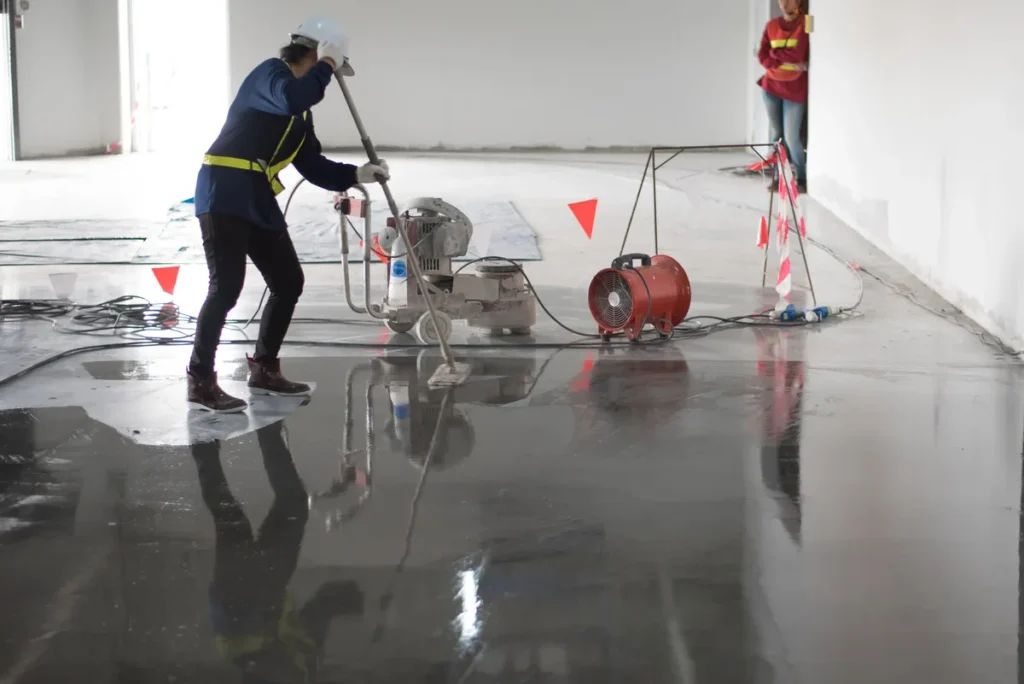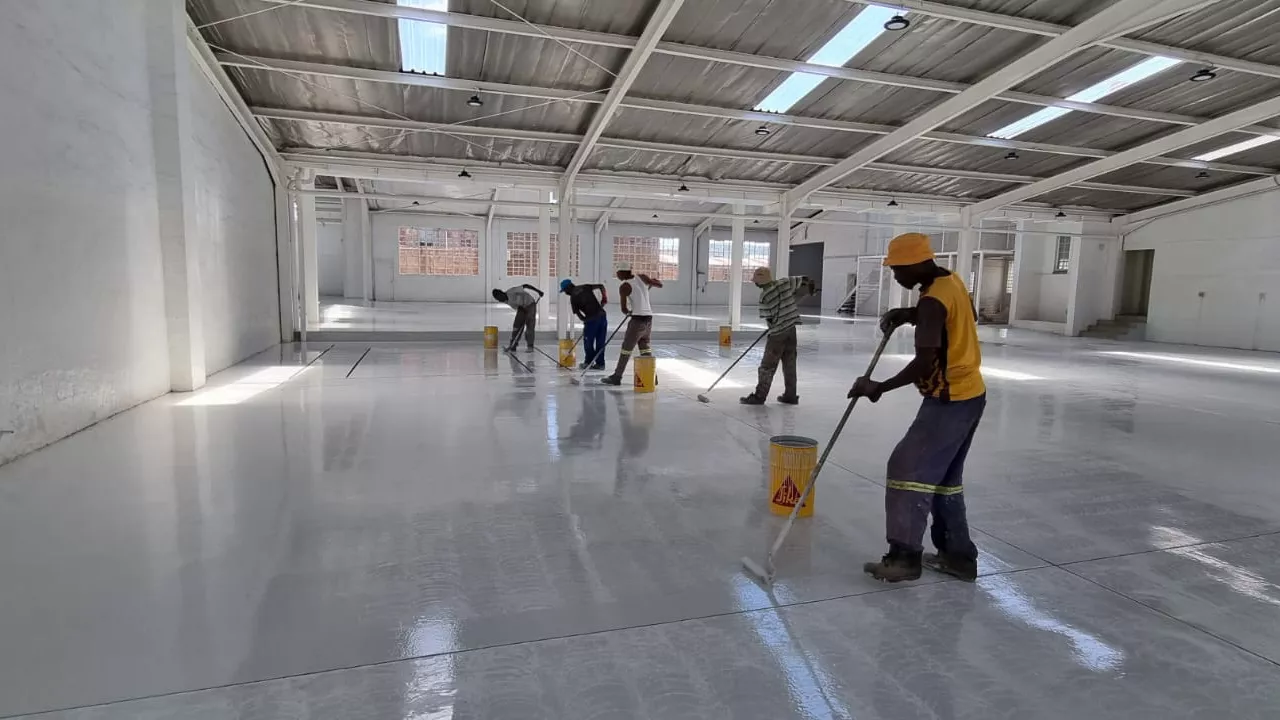In Houston, both homeowners and business owners are looking for flooring solutions that combine durability, style, and cost-effectiveness. That’s where epoxy flooring installation comes in. Unlike traditional flooring, epoxy transforms plain concrete into a high-performance surface that resists wear, chemicals, and heavy traffic—all while looking sleek and modern.
At Rhino Epoxy Pro, we’ve installed epoxy floors in homes, garages, warehouses, restaurants, and commercial spaces across Houston. This guide breaks down the step-by-step epoxy flooring installation process, benefits, costs, and what to expect when choosing epoxy for your space.
What is Epoxy Flooring Installation?
Epoxy flooring is created by applying a two-part resin system (epoxy resin + hardener) onto prepared concrete. The materials bond chemically, forming a strong, seamless coating. Depending on the finish, epoxy can look industrial-grade tough, stylishly decorative, or even luxury-inspired.
Businesses and homeowners in Houston choose epoxy flooring because it’s:
Durable – Handles vehicles, machinery, and foot traffic
Low Maintenance – Easy to clean and care for
Safe – Slip-resistant finishes available
Customizable – Metallic, flakes, or solid colors
If you’re new to epoxy, we recommend also reading our guide on Epoxy Flooring Houston: Step-by-Step Guide for a full overview of epoxy options in the city.
Benefits of Professional Epoxy Flooring Installation
1. Long-Lasting Durability
Epoxy bonds with concrete, creating a surface that can last 10–20 years when properly maintained.
2. Enhanced Safety
Non-slip finishes make epoxy flooring ideal for garages, commercial kitchens, and warehouses.
3. Hygienic & Easy to Clean
Epoxy flooring is seamless, leaving no room for bacteria, dirt, or spills to hide—perfect for restaurants and medical facilities. (See our blog on Epoxy Flooring for Restaurants).
4. Cost-Effective
While epoxy flooring cost may vary, it often saves money over time thanks to its longevity and minimal maintenance. For a detailed breakdown, visit our guide on Epoxy Flooring Cost in Houston.
Step-by-Step Epoxy Flooring Installation Process
Installing epoxy requires proper preparation, skilled application, and patience. Here’s how professionals like Rhino Epoxy Pro handle it:
Step 1: Surface Preparation
The most important part of epoxy flooring installation is preparing the concrete.
Cleaning dirt, oils, and grease
Repairing cracks or chips
Grinding or shot-blasting to open concrete pores
This ensures the epoxy adheres perfectly.
Step 2: Applying the Primer Coat
A thin primer layer helps epoxy bond tightly with the concrete surface. It also seals pores and provides an even foundation.
Step 3: Mixing Epoxy Resin & Hardener
Epoxy resin and hardener are mixed together to create a chemical reaction. Timing is critical here, as the mixture has a limited working window.
Step 4: Applying the Base Coat
The base layer creates a smooth, durable surface. Depending on the desired look, solid colors, metallic pigments, or epoxy flakes may be added.
Metallic Epoxy for luxury spaces
Epoxy Flakes for textured, non-slip surfaces
Epoxy Coating for classic, high-gloss finishes
Step 5: Decorative Layer (Optional)
Businesses often choose to incorporate company logos, custom colors, or design patterns at this stage.
Step 6: Topcoat Application
Finally, a protective polyurethane or epoxy topcoat is applied. This enhances durability, adds UV protection, and provides the desired gloss level.

Epoxy Flooring Installation Options for Houston Homes and Businesses
1. Residential Epoxy Flooring
Perfect for garages, patios, and basements. Learn more in our blog on Residential Epoxy Flooring Options.
2. Commercial Epoxy Flooring
Designed for offices, restaurants, healthcare facilities, and retail spaces. Explore our full guide on Commercial Epoxy Flooring.
3. Industrial Epoxy Flooring
Best for warehouses, factories, and plants that need extreme durability and chemical resistance.
How Long Does Epoxy Flooring Installation Take?
Residential garages: 2–3 days
Medium commercial spaces: 3–5 days
Large warehouses: up to 1 week
Curing time is essential. Even though epoxy may look ready in 24 hours, full hardness develops within 5–7 days.
How Much Does Epoxy Flooring Installation Cost in Houston?
On average, epoxy flooring installation costs $4 to $12 per sq. ft. Factors that affect pricing include:
Floor size
Concrete condition and prep work needed
Epoxy type (flakes, metallic, anti-static, etc.)
Design complexity
For tailored estimates, check our detailed post on Epoxy Flooring Cost in Houston.
Why Hire Professionals Instead of DIY Epoxy Flooring Installation?
Many Houston homeowners try DIY kits, but professional installation offers:
Better surface prep (essential for adhesion)
High-grade epoxy materials not sold in retail stores
Flawless finish without bubbles or uneven patches
Warranty coverage for peace of mind
DIY might seem cheaper, but mistakes often lead to costly rework.
Why Choose Rhino Epoxy Pro for Epoxy Flooring Installation in Houston?
At Rhino Epoxy Pro, we specialize in epoxy flooring for both residential and commercial properties. Clients choose us because:
We use premium epoxy systems built for Houston’s climate
Our team handles everything from prep to design
We provide transparent epoxy flooring cost estimates
We also offer complementary services like Concrete Polishing, Concrete Staining, and Pavement Striping
FAQs About Epoxy Flooring Installation in Houston
How long does epoxy flooring installation last?
With proper care, epoxy floors last 10–20 years.
Can epoxy flooring be installed in outdoor spaces?
Yes, with UV-resistant topcoats, epoxy works well for patios and pool decks.
Is epoxy flooring safe for businesses?
Yes, it’s slip-resistant and chemical-resistant, making it ideal for commercial use.
How do I maintain epoxy flooring?
Simple sweeping and occasional mopping with mild cleaners keep it looking new.



Comments are closed